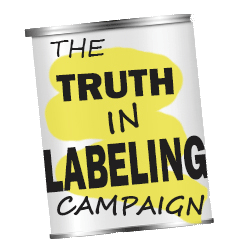It’s not unheard of for corporate propagandists to hijack grassroots organizations to further their agendas. Of course, the bigger, more respected and highly financed a non-profit group is, the better.
From what we’ve learned in dealing with the Center for Science in the Public Interest (CSPI), led until three years ago by its salt-and-fat fighting guru Michael Jacobson, we can’t help but wonder when CSPI lost its way, promoting industry strategies instead of the “public interest.”
When Jacobson stepped down as president of CSPI in 2017 (although still said to be serving as a senior scientist with the organization), he was hailed as a “pioneer of food activism.” CSPI got big media buzz on crusades such as the movie-theater popcorn “Godzilla” campaign and the fettuccini Alfredo “heart attack on a plate” press release – leading to the group frequently being referred to as the “Food Police.”
But as Jack Samuels (co-founder of the Truth in Labeling Campaign) discovered many years ago, asking for CSPI’s involvement in what we thought would make more people aware of the dangers of MSG ended up going in the other direction.
Science in the corporate interest?
When Jack first approached CSPI back in the early 1990s, it seemed the group was aware of both the health risks of consuming MSG as well as the fact that the FDA was refusing to provide full disclosure of manufactured free glutamate (MfG) on food labels (still true to this day).
In 1993 he received a letter from Margo Wootan (recently promoted to CSPI vice president for nutrition) that indicated CSPI knew full well there is a difference between natural and “synthesized MSG,” as she called it. “It is a question that does not seem to be adequately addressed,” she wrote, accurately stating that manufactured MSG contains both D and L glutamic acid, which might explain why some people “react only to synthesized/added MSG but not to naturally occurring glutamate” that contains only “L.” (For more on that topic, go here).
While that might seem like a negligible point, it’s key to the glutamate industry’s spin that there is zero difference between unadulterated glutamic acid (including what’s found in the human body) and manufactured glutamic acid.
Jacobson and CSPI had the power to turn that into headlines. But they didn’t. Perhaps it wasn’t as sexy as “heart attack on a plate,” but it sure would be as important to the public.
After Jack received that initial note, which made him think we had found allies in our efforts to inform consumers, CSPI’s attitude mysteriously changed.
Jack described one case where an independent journalist was planning to cover a meeting of the Federation of American Societies for Experimental Biology (FASEB), organized to hear testimony on the safety of MSG. The writer canceled, however, after talking to Jacobson and being told MSG was a “non-issue,” and that he would be wasting his time.
Later, when Jack had high hopes that the FDA was taking notice and might act on unlabeled MfG in food, a CSPI staffer wrote to the agency saying that not enough was known about MSG to take any action. Jacobson even went so far as to tell the Wall Street Journal in an interview in 2007, “I don’t see normal amounts of MSG as posing a risk to the vast majority of people.”
Jacobson continued to practically parrot the glutamate industry when he told a writer in 2013 that he has been “waiting 30 years to see any decent studies, especially of people who claim to be extremely sensitive to MSG…”
And, as the saying goes, actions speak louder than words. Currently CSPI actively promotes food products that contain MSG and MfG, such as Campbell’s Vegetable Soup with beef stock, loaded with yeast extract, hydrolyzed soy protein, hydrolyzed wheat gluten and monosodium glutamate. The group has a photo of the can with a green box around it indicating the soup’s superiority to other, higher-salt brands on its Pinterest page.
For anyone who still believes that CSPI is a consumer watchdog, ferociously guarding your best interests, it’s time to take another look. That reputation is certainly what supports the group, which is said to have an annual income of over $17 million, mostly from newsletter subscriptions and to a lesser degree, donations. And with the new CSPI president, Peter Lurie, coming straight from the FDA, it doesn’t seem too likely that the group will change its tune anytime soon.
As was said in an editorial over 20 years ago: With enemies like CSPI, the industrial barons squeezing the life out of our natural bounty need no friends.
If you have questions or comments, we’d love to hear from you. If you have hints for others on how to avoid exposure to MfG, send them along, too, and we’ll put them up on Facebook. Or you can reach us at questionsaboutmsg@gmail.com and follow us on Twitter @truthlabeling.


